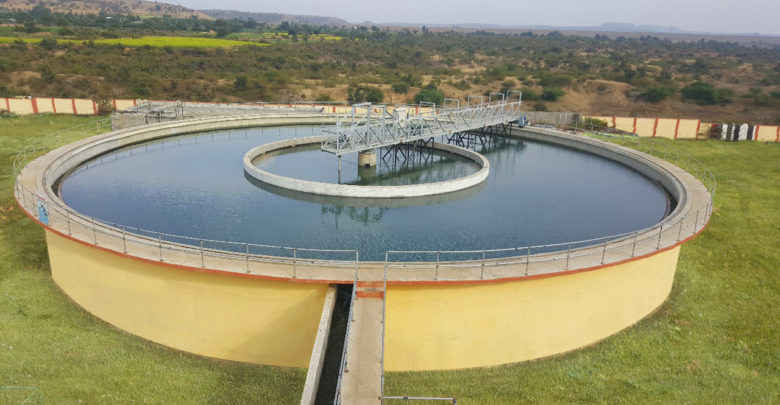SPML Infra Limited is India’s leading infrastructure development company

SPML Infra Limited is India’s leading infrastructure development company with focus on sustainable infrastructure development promoting access to essential services (water, electricity, sanitation, and municipal solid waste management) to all. With over 3 decades of experience & pan India presence, it has executed more than 600 projects and created significant value for the country, touching the lives of millions of people with provision of drinking water facilities, wastewater treatment, integrated sewerage network, better municipal waste management, power transmission & distribution and lighting up homes. Currently SPML is developing infrastructure projects worth USD one billion and provides drinking water facilities to more than 40 million Indian populations through its various projects.
SPML Infra is among the World’s Top 50 Private Water Companies as per the survey by Global Water Intelligence, London. SPML Infra’s first Smart City Project at Vikram Udyogpuri, Ujjain is being developed as a global manufacturing and investment destination under the Delhi Mumbai Industrial Corridor (DMIC) scheme. This is first of its kind of a green field smart city which will have all smart utilities connected with technology for seamless services. SPML has integrated its strengths in depth engineering, process technology, project management, resource management, apart from construction and commissioning. The projects executed by SPML have set new benchmarks in terms of modern construction and time management.
SPML Infra is currently executing some landmark projects in water and power segment. A few key projects are as under:
- Saurashtra-Narmada Avtaran Irrigation (SAUNI Yojana), Phase 2 in Gujarat to provide drinking water facilities to around 39 million people across 132 towns and 11,456 villages and to irrigate 1.8 million hectare of land in Saurashtra, Kutch and north Gujarat benefiting millions of farmers. SPML Infra earlier completed the Phase I of this project which was inaugurated by Hon’ble Prime Minister in April 2017.
- SPML is executing urban water supply project for improvement in water distribution networks in Delhi for Mehrauli & Vasant Vihar areas for about 42000 house service connections including operations & maintenance for 10 years.
- SPML is executing 6 important ADB funded 24X7 urban water supply projects in Karnataka in the cities: Bellary, Raichur, Hospet, Gadag-Betageri, Sindhanur and Haveri to serve a combined population of about 1.2 million people with operations & maintenance in all cities for 5 years.
- SPML Infra helped in significantly reducing non-revenue water from 56 percent to 27 percent under UFW Project in Bengaluru by using innovative helium leak detection technology to accurately identify and locate hidden leaks in large and small pipes. The saving of 39.2 million liters’ water per day will be used to provide drinking water facilities to 110 villages for which creation of water networks are under progress in the extended colonies of Bengaluru.
- SPML has established a leading position in the treatment of wastewater from design to application of technology, construction to management and operation of sewage treatment plants, common effluent treatment plants, tertiary and water reuse treatment plants, sludge treatment, bio-gas & power generation. It has constructed a number of sewage treatment plants like 240 MLD STP in Ahmadabad, 72 MLD STP in Delhi, 70 MLD STP in Nasik, 42 MLD STP with sewerage network in Kanpur, and 115 MLD decentralized STPS and pumping stations as one of India’s largest and first Comprehensive Underground Sewerage System in Mira Bhayandar, Maharashtra.
- SPML Infra has recently completed technologically advanced 220 kV Gas Insulated Substation (GIS) in West Bengal and 400 kV – 500 MVA Autotransformer in Uttar Pradesh and Rajasthan for quality power supply and distribution in the designated areas.
- SPML Infra is executing World Bank funded 16 new 132 kV Substations project in Tripura under North East Region (NER) Power System Improvement Scheme.
- Executing rural electrification projects in Patna & Gaya district in Bihar with 65,000 kilometers of 33 kv lines with ACSR Conductors, 11,400 kilometers of LT Lines to provide over 2.3 lac connections to rural and semi urban areas mainly below the poverty line (BPL) households.
- Give us your opinion on the industry using new trends for better, smart and efficient launches to deliver promising growth potentials.
The infrastructure development industry is getting bigger in India and innovation and technology are drivers for growth. The liberalization of policies and regulations with a deliberate strategy by the government to promote infrastructure development for sustained economic growth is yielding good results. There is huge demand for construction of large and more complex projects with precision in shorter durations.
The technology has advanced in all segments of life and there are new technologies available for infrastructure companies as well. The design engineering have transformed from being a flat format to 3-dimensional, which helped in minimizing errors and improving productivity during the execution period. In the past, project management and collaboration were done through emails and sharing platforms. But the recent advancements in technology have provided the right project management tools that can help in better control on project execution and successful completion. The advanced technology used in project management has created smoother operation with enhanced performance. They have also increased the teams’ efficiency and have created a better overall collaborative experience. Procurement and transportation of equipment, machineries and materials are important part of infrastructure development and with the advent of advance technology for transportation, intelligent logistics, and faster mobility is making project execution more efficient.
There are a number of state-of-the-art technology solutions available for collection and dissemination of data during the construction phase of an infrastructure project. Project tracker is another technological advancement that incorporates the use of smartphones in project execution that provides real time information for taking swift remedial steps that hampers the work. For future projects to be successful and completed in a reduced timeline, project management teams must continue to embrace and implement the use of technological tools.
- Discuss your future business plans and strategies of the company in various practices.
SPML Infra has recorded gross revenue of INR 21,101.87 million in the financial year 2017-18. The company has also registered a healthy profit after tax (PAT) for the year at INR 529 million. It also strengthened its business competitiveness through an increase in the pre-qualification limit for water infrastructure business by achieving revenue of INR 12,000 million. At present, SPML Infra has an order book of approximately INR 69,000 million which will help us in steady topline and improved bottom-line growth. With several schemes initiated by the government for developing infrastructure for water supply and power distribution, we are expecting to add new projects in this segment.
SPML Infra is focusing on completing the current ongoing projects on time and has plans to expand water, wastewater, irrigation and power business across India for which it is bidding for selected projects in these segments. SPML Infra is also looking forward to complete the SAUNI Yojana pipeline project in Gujarat, smart city project in Madhya Pradesh; drinking water projects in Rajasthan and several power transmission & distribution projects in several states of India. Considering the niche position SPML Infra has created in the water and power segment, we intend to use it to our advantage. In essence, our business plan for the year is to maximize our strength to achieve the overall objective.
- What are your views on the budget announced for the industry and give us a few details on the related financial ambitions as a key player.
Budget 2018 presented an encouraging outlook for a wider segment of industries as the Finance Minister has taken a long term view by focusing on the development of agriculture, healthcare, education and infrastructure sector. The thrust on job creation through rural and infrastructure development projects will improve income levels leading to increase in economic activity and growth. Promoting digital economy by allocating funds towards creating digital infrastructure, increasing cashless payments and building smart cities is encouraging.
The Budget addressed social sector priorities and a clear plan to boost infrastructure. It recognizes the role of “Infrastructure sector” as growth driver of the economy with an estimated investment requirement of massive INR 50 lakh crore.
The INR 1,94,280 million allocation for water supply projects under AMRUT schemes will help in providing drinking water facilities to urban and semi urban households. The increase from INR 2,00,000 million to INR 4,00,000 million for irrigation projects and dedicated micro irrigation fund of INR 50,000 million will help the agriculture sector with good production and subsequent growth in economy.
The target to achieve 100% rural electrification with an increase of 35% in budget allocation depicts government’s progressive thinking in meeting 100% electrification by 2018. The government has undertaken several initiatives to bring electricity to all homes in India and the finance minister during his budget speech has iterated that 100 per cent electrification of villages will be completed. The provision for rationalizing linkages of coal to power to railways will have lasting impact to make it more efficient. The government’s commitment to rural electrification and moving towards a policy based administration with increased focus on T&D upgrade will give much needed boost to the power sector.
There is a major enhancement announced to the renewable energy sector with excise and customs duty relaxation and roll out of the second phase of solar power generation of another 20,000 MW will go a long way in strengthening India’s position in the global solar industry. It will also help in the long term focus on the government’s RE target of 175 GW by 2022 which includes 100 GW of solar and 60 GW of wind. The move to expand solar power generation on the railway stations is encouraging to rooftop and distributed solar power segment.
This year’s budget with progressive thinking will lead India to an inclusive growth path with clear focus to develop robust infrastructure and lift the economy to achieve the GDP target of the next fiscal.
- Is there is anything that you would like to share with your audience at large – the motives and principals of the company to remain competitive in the near future.
In its 36 years of existence, the company has acquired a thorough understanding of water and power sector. With a number of water projects in different states, SPML Infra provides drinking water facilities to almost 40 million people in India. The company’s extensive experience and knowledge of the water sector has led it to become the top water management companies in the country and among the World’s Top 50 Private Water Management Companies.
The vision for growth is driven by operational compliance, quality of service, efficient project execution and continuous business process improvements. SPML Infra strives towards excellence in all operations through compliance with world-class quality systems in its specific field of activities, ensuring a continuous improvement in project execution and quality management. SPML Infra has also been gaining an edge by adopting new technologies essential for growth such as SAP, ICT and Integrated Management Information System (IMIS) for smart utility management. In essence, our business model for success would be to maximize our strength to achieve the overall objective.

